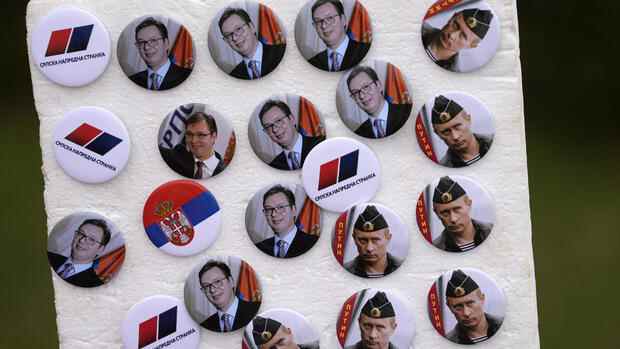With his seesaw policy between Brussels, Moscow and Beijing, the increasingly autocratic ruling Serbian President Aleksandar Vucic is destabilizing the Balkans. Will he become Moscow’s pawn?
(Photo: dpa)
Berlin The war in Ukraine is also affecting the Balkans. And nowhere is this more evident these days than around Serbia, where the elections will be held this Sunday.
Serbia’s head of state Aleksandar Vucic said in an interview with the Handelsblatt: “We cannot survive without the EU”. His country has clearly opted for an EU course. Nevertheless, Serbia could “do good things with China”. And Serbia has a free trade agreement with Russia. Two pro-Russia demonstrations – the largest in Europe – have taken place in the capital Belgrade since Moscow attacked Ukraine.
“We have great power interests of other great powers visible in Serbia,” said Austrian Chancellor Karl Nehammer, referring to the United Arab Emirates, China and Russia, which have invested heavily in Serbia in the agricultural sector. Martin Gaber from Germany Trade & Invest in Belgrade speaks of a “rocking policy” in particular with regard to Moscow.
Reasons for this: Large parts of the population have been pro-Russian since the Yugoslav wars and Serbia is completely dependent on Russian oil and gas supplies. They get it from the Kremlin on preferential terms.
Top jobs of the day
Find the best jobs now and
be notified by email.
Brussels and Berlin are thus faced with a dilemma: they must catch the politically meandering Vucic if Belgrade is not to become the Kremlin’s gateway to Europe. Because the entire region is still very volatile.
Any further delay in EU accession would open the Balkans up to third-party interference, Nehammer warned. The federal government takes a similar view: “Germany will throw its political weight into the scales for EU expansion to include all six countries in the western Balkans,” said Manuel Sarrazin, the federal government’s new special envoy for the countries of the western Balkans, to the Handelsblatt.
Addressing Serbia specifically, he added: “We want you in the EU, but we do not turn a blind eye to the difficult domestic political situation in Serbia, the lack of pluralism, the deficits in the rule of law and media freedom.”
President before elections
Vucic, who has ruled since 2017 and used to be the propaganda chief of the former authoritarian head of state Slobodna Milosevic, has made large parts of the political system subject to himself and wants to defend this in three elections this Sunday: he himself is aiming for re-election and has recently confident that “anything below 60 percent would be a failure”.
At the same time, he had the parliamentary elections brought forward in order to get the two-thirds majority of his so-called Serbian Progressive Party confirmed. And in the capital, Belgrade, he is hoping for a follower as mayor.
According to the Bertelsmann Transformations Index 2022, which examines the democratic constitution of countries, Serbia’s political system is dominated at almost all levels by just one party. Max Brändle from the Friedrich Ebert Foundation in Belgrade, which is close to the SPD, also criticizes the growing autocracy.
“A large part of the media is controlled by the government,” says Gaber. The 52-year-old is therefore omnipresent in the largest successor state of Yugoslavia, which has almost seven million inhabitants.
The opposition boycotted the last elections
The opposition felt so oppressed that they boycotted the last parliamentary elections. Now, like in Viktor Orban’s neighboring country Hungary, she is trying to come up with a single candidate: the former chief of staff Zdravko Ponos is challenging Vucic, of all people a former representative of the military, which is highly regarded in Serbia. Nevertheless, all polls expect the incumbent to win.
He advertises with “Dela govore” – the facts speak for him, i.e. the economic successes he has allegedly achieved. According to the latest forecast by the Eastern European Development Bank EBRD, the country’s gross domestic product should increase by 3.3 percent in the current year and by four percent in 2023 after 7.5 in the previous year. As one of the few European countries, Serbia has already economically sweated out the Corona slump of 2020.
Serbia’s economy is doing well – also thanks to Germany
“President Vucic attaches great importance to the Serbian economy doing well and wants German investments for this,” said Sarrazin, adding: “To do this, however, he must create stability, a clear commitment to the EU perspective and more pluralism domestically. Otherwise, after the war in Ukraine, German companies will hardly be persuaded to invest.” It will only be clear after the votes have been counted whether the three-party elections this Sunday will send such a signal of departure.
More: Aleksandar Vucic: “We cannot survive without the EU”
